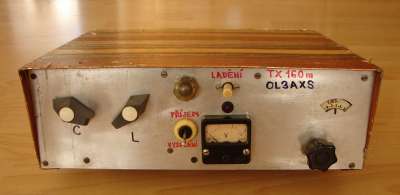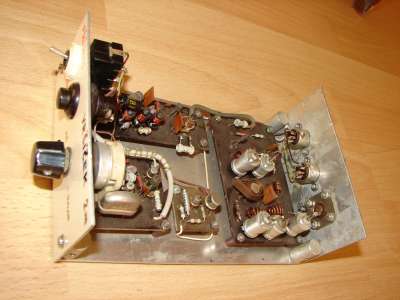Some history (boring - better skip!)

My primary interest in the hobby was electronics, I discovered the other sides of the hobby later.
I was fascinated how easy we can talk over long distances using radio (remember, it was in 70's),
over the borders with friendly people having the same interest...
Of course, each start is difficult (after first phone QSO and learning CW I managed my first contacts
using morse code at age of 13). But I improved quickly so when I was 15 and I got my first license
I was able to operate elbug at standard speed. I enjoyed talking long hours with my friends on 160m CW (funny
thing is the rules forced us to write the whole QSO text into logbook, it is nice reading after the
years). Of course I was happy when I work a more distant station - I remember my first contact with
England with my homebrew 5W transmitter. I would like to get more DX stations so I built an amplifiers
(the power limit on 160m was 10W only that gives low chance for really rare DX, so I "improved" it a bit;
I hope nobody will punish me for that after many years :-)) The WAC (Worked All Continents) award on 160m that
I got after 4 years activity is not a bad result...
I enjoyed also high speed morse (QRQ), I took part in morse code competition organized by czechoslovak HAM
organization with good results.
As I said I started on 160m, but the other band in order was 2m (the OL stations were allowed to operate just 160m,
2m and 70cm).
My first home made 160m CW transmitter (built at age 14)

Unfortunatelly my QTH was not good for solid VHF operation, so when I built my first VHF
transmitter (about 200 mW output, VXO oscilator in CW part of the band) I was able to manage only about
10 QSOs during each contest using 80m long wire antenna (! same as for 160m !).
My homebrew 144 MHz CW transmitter

I was active from portable
locations as well later, also using "high power" 5W from QQE03/12 homebrew amplifier.
The last band I managed at age of 18 was 70cm, using germanium transistor converter for HF receiver
and varactor multiplier (144->432 MHz), about 100 mW output! It gave me about 20 QSOs in Fieldday.
I concentrated more on short waves during my university years - one reason was my full ticket allowed me
to operate all HF bands and I became member of OK1KQJ where we had a transceiver Yaesu FT-200, able to
work on the other bands! I built new transceivers at home as well (for example CW/SSB for 160 and 80m with
transvertor for 10m), CW transceiver for 40m, CW/SSB for 144 MHz) so I improved my score on the other
bands as well.
The breakthrough moment happened in 1991 when I bought a Kenwood TS-850 radio. My first commercial equipment,
definitely not cheap for that time, but long time dream. I immediately started searching for new DXCC on all
bands, I put a multiband beam / Quad on my tower and my score improved!
I didn't forget on VHF as well, I put a 144 MHz Yagi on top of the tower and monitored the band for good
propagation (I enjoyed Es, Aurora,..). Later when I bought commercial equipment for 2m and 70cm I started
my experiments with satellites (RS, AO-10, AO-13,...).
Maximum of my activity was during years when I was working at sea. When I left the ship I had plenty of
time at home, and most of that time I devoted to radio. I operated VHF packet radio from the ship as well - it was interesting to compare activity in different countries (for example I was surprised that some PR sysops had no idea about SW and HW commonly used in different countries). While at open sea I was able to cacth the only one packet radio VHF signal - that of space station MIR (callsign R0MIR) - see some captured data. I took part in HF contests as well, mostly from
club station in multi-single or single-operator category (several trophies here).
I was attracted by digital modes as well. My first experience was at age of 17 when I built a homebrew
RTTY converter ST-6 with built-in CRT tuning indicator. A made a lot of QSO from club station using
old mechanical RFT T51 teletype... Later I modified my first "computer" Sinclair ZX-81 for USART interface,
I wrote an assembler program for it for RTTY. When packet radio appeared I assembled a modem for it
(Baycom, YAM,...), I enjoyed advantages of DX cluster. I operated pactor using KAM+ controller for some
years, I was there when PSK31 appeared for the first time. But unfortunatelly I am too busy last time to follow the latest trends, but I am fascinated by new modes like JT65 and WSPR (I believed for long time the CW is the best mode for extremely weak signals but now I had to change my opinion.)
Present activity
Last update August 2025
Definitelly it is much lower than before. I am limited by my work, my family needs some time, I purchase
a house recently that needs a lot of modification so the resources are limited. Also the other engine that
moved me forward in the past is less strong than earlier: my other HAM colleagues. Similar problems like me - less
time, lost of interest...
I promiss myself I will be more active again (just when I finish this and that), I hope so.
What is the situation? Several times a year I spare a weekend to take part in a contest like before, usualy from club stations OL3A or OL3Z in multiOp SingleTx category, rarely as SingleOpSingleBand as OK1DX. It is funny, but hard to compete these days - to keep the equipment up to date needs a lot of effort & time. I am happy when I catch some nice DX (the situation
that I find a new DXCC on any band is very rare now), I enjoy the pileup. I am trying to work all new DXCC as
soon as they appear to have my list complete. Otherwise I concentrate on 18 MHz where I have a nice
antenna. I am happy when I can give a new DXCC to others... I operate rarely QO100 satellite on CW as
well, just for fun without any goal. I gave up LEO satellites - I dismounted my shack and VHF/UHF antennas in Holysov and no plans to rebuild it in Kasperky.
My plan for close future is to improve my station in Kasperske Hory (see tower story). I build a HAM shack with workshop there as well, I would like
to concentrate more to some electronic project (back to roots). So it looks like less radio activity but perhaps more fun.
I enjoy the new QO100 satellite, see the article here.
Morse code and me
I like CW very much, I have learned it in young age and I consider it as one of basic stones of HAM radio.
But it doesn't mean that I overprice it. The radio amateurs not knowing CW are HAM's as well (just I regret they
cannot enjoy that funny part of the hobby).
I don't think it was wrong to remove CW from HAM exams - it is just requirement of the time.
Yes, to learn CW was a proof that the HAM takes the hobby seriously, but I don't think the new non code HAMs
are worse than the others... I enjoy high speed CW (I took part in some QRQ competition, like this
in Italy or at home ), I am member of High Speed Club, most of my QSO's are on CW.
I enjoy CW chats (just in last years it is harder to find partners on the bands, also due to I concentrate more to DXing
and my free time is limited). I enjoy CW contesting as well, sometimes I use contest logging just for logging and not
for CW keying - it gives possibility of much flexible reaction to what is happening on the band, or I mix it (definitely
the computer keying helps a lot when the contest is very long or boring / gives you few moments to relax).
But it is hard to imagine to me that some stations are able to take part in CW contest without having paddle connected,
just using PC keyboard (!).
FT8 and me
I always enjoyed digital modes, it is amaizing how the digital signal processing can allow decoding/QSO to be possible
also in marginal signal to noise ratio. Years ago I supposed the CW is the most effective, but the things changed
quickly. On the other side I affraid this technique highly reduces human contact, you don't hear the voice of the
other party, the keying style of CW operator. I like HAM radio because it is community hobby, where you meet other
colleagues, not just you see their callsign on computer screen. Technology is part of it, but it should extend the
the human contact and not reduce it.
So currently I consider FT8 as interesting extention of HAM traffic, but it doesn't compete to my main favorite
mode, CW. I think FT8 is appropriate when signals are so weak that CW fails. I don't understand why to make
a lot of FT8 QSO with stations that are so strong that they can continue on CW or SSB! As a result my FT8 activity
is reduced to DX and weak signal partners (sorry, I don't reply to strong signal calls, esp. when I call CQ DX
I never answer to stations from Europe). If you are from Europe and you hear me on FT8, please spare time and don't
call me FT8 - instead of that check CW band, you can find me there, too! Also, when the FT8 frequency is overcrowded,
I don't call CQ or CQDX and I just try to catch rare weak DX signal in huge mess...
Where you can hear me
On 17 m, preferred frequency 18.076 MHz CW. On 80 m CW (no SSB, CW only), on 160 m during contests or rarely over weekends during winter season.
Satellites, as mentioned above. 145.325 MHz CTCSS 127.3 Hz simplex. I am active on QO100 satellite as well - I prefer
CW with my QRP CW only TX (I don't hunt DX there, it is chance for nice clean CW chat at any time, also
technically interesting. I don't count QSO via OQ100 to my satellite DXCC table).
HAM visitors welcomed!
If you travel nearby or you are on holiday in Sumava region you can stop in Kasperske Hory and visit my HAM shack. I like to meet other HAMs, share experience, talk about common interests... It gives me another energy for the hobby!


